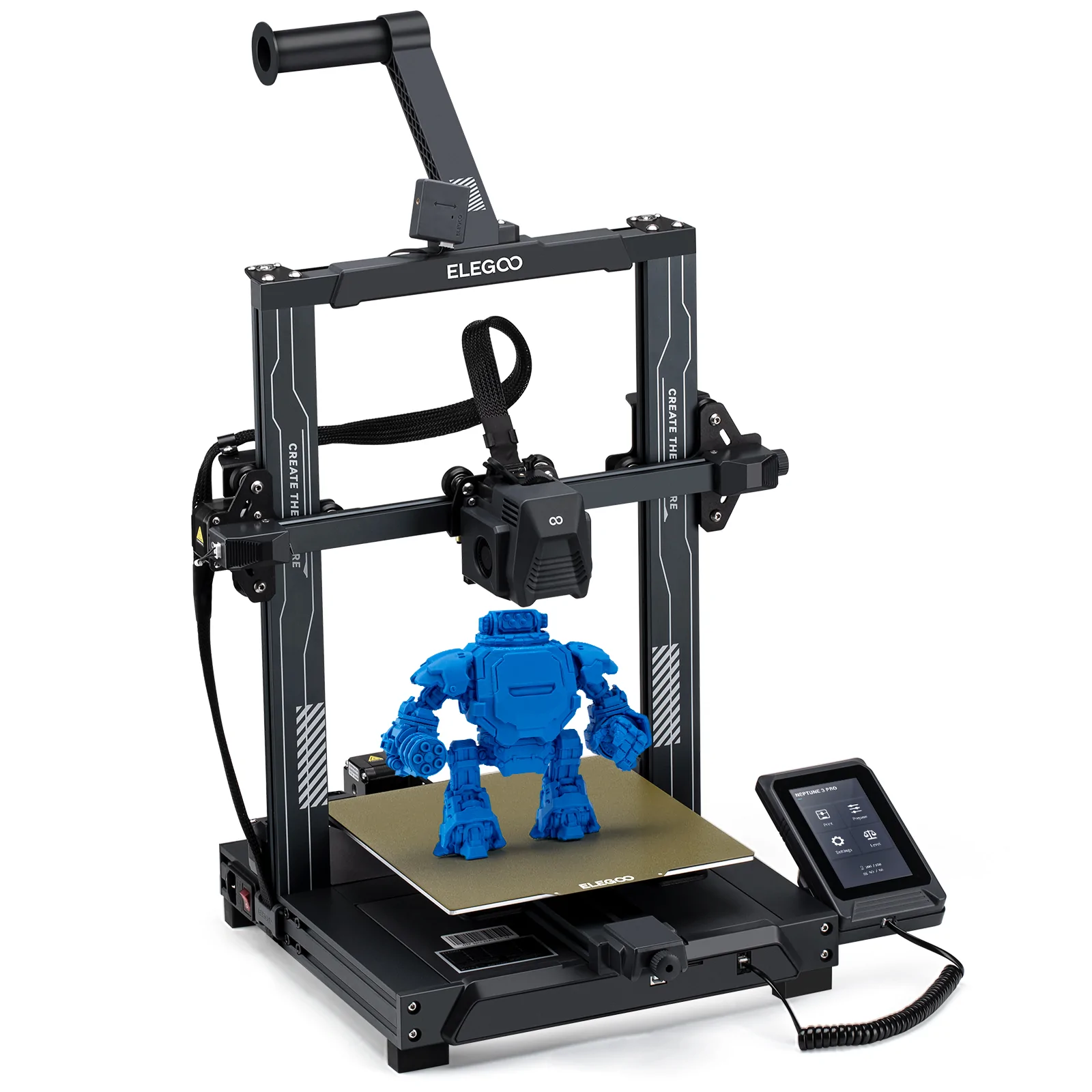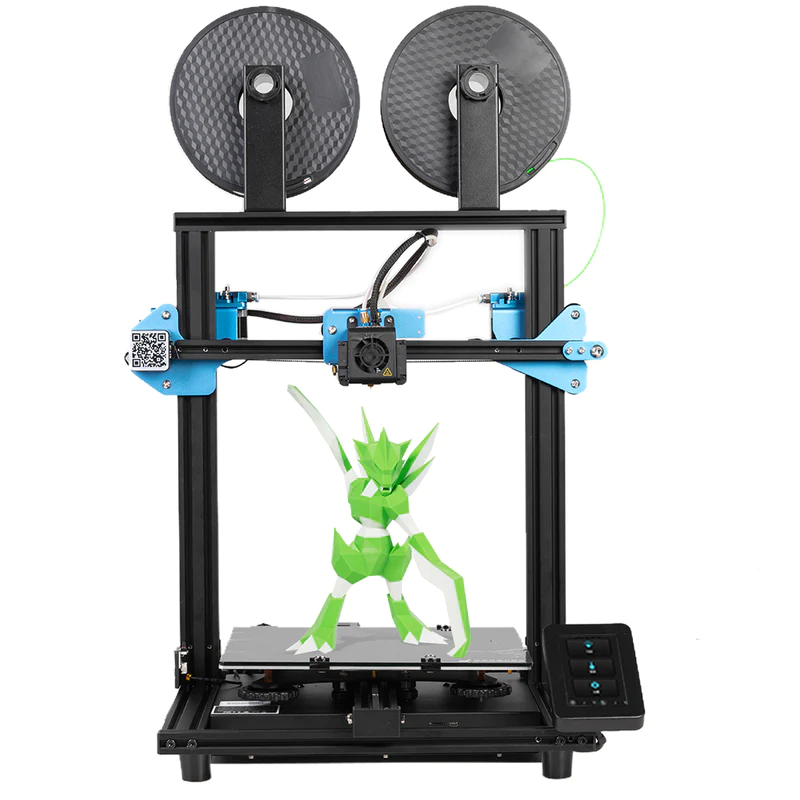Compare Neptune 3 PRO vs SV02
Comparison between the best 3D printers
Choose the best 3D printer at the best price. The cheapest 3D printers are here.
Buy a 3D printer here with 3D Fila.
 |
 |
|
| Model | Neptune 3 PRO |
SV02 |
| Printing Material | Filament | Filament |
| Buy Filament for Elegoo Neptune 3 PRO | Buy Filament forSovol SV02 | |
| Estimated price | $230,00 | $209,00 |
| Manufacturer | Elegoo | Sovol |
| Release Year | 2022 | 2020 |
| Print Volume [mm] | 225x225x280 | 280x240x300 |
| Printer Size [mm] | 445x515x475 | 539x493x710 |
| Weight [kg] | 8,1 | 11,86 |
| Power Loss Recovery | YES | YES |
| Enclosed printer | NO | NO |
| Bed Leveling | Automatic | Manual |
| Filament End Sensor | YES | NO |
| Bed type | Heated | Heated |
| Power supply system | Direct Drive | Bowden |
| Standard nozzle | 0,4 | 0,4 |
| Maximum Nozzle Temperature [°C] | 260 | 260 |
| Maximum Bed Temperature [°C] | 100 | 110 |
| Maximum printing speed [mm/s] | 80 | 120 |
| Filament holder | YES | YES |
| Camera for supervision | NO | NO |
| Recommended filaments | PLA, PETG, Tritan, Flex, ABS | PLA, PETG, Tritan, Flex, ABS |
| Recommended slicers | Cura, Simplify, Slic3r, IdeaMaker e outros | Cura, Simplify, Slic3r, IdeaMaker |
| Maximum Resolution [mm] | 0,1 | 0,1 |
| Processor | ||
| Display | Display touchscreen 4,3'' | Display touchscreen 4,3'' |
| Power Supply | 250 | |
| Connectivity | SD / USB | |
| Operating systems | Windows, Mac, Linux | Windows, Mac, Linux |
| Date of registration in the system | 2023-03-02 | 2022-11-10 |
| Release date | 2022 | 2020 |
| Extra features | The Elegoo Neptune 3 Pro printer stands out for its easy assembly and automatic bed leveling, ideal for different levels of users. Equipped with a direct-drive extruder and dual gears, it offers excellent adhesion to slippery materials such as TPU. It incorporates dual screws on the Z-axis, ensuring stable prints, and features an integrated task light for improved visibility. With a PEI-coated build plate and a detachable touchscreen, it combines functionality and convenience. The printer also features an efficient cooling system, filament sensor and a simplified user interface. | The Sovol SV02 is a dual extrusion 3D printer with two inputs and one output hotend, silent motherboard and 4.3" color touchscreen. It includes a tempered glass platform for glue-free adhesion, dual Z-axis for more stability, and fast heating with Mean Well power supply. It has a resume printing function and support for upgrades, such as an automatic leveling sensor. |
| Support for multiple colors and materials (AMS and CFS) | NO | NO |
Notes * |
||
| Cost-benefit | 6 / 10 | 7 / 10 |
| Hardware | 2.4 / 10 | 1.5 / 10 |
| Tela | . | . |
| Print volume | 3 / 10 | 4 / 10 |
| Performance | 0 / 10 | 1 / 10 |
Conclusion |
| In comparing the Elegoo Neptune 3 PRO and the Sovol SV02, both printers present strong features, yet they cater to different user needs and preferences. The Neptune 3 PRO shines with its user-friendly characteristics, such as automatic bed leveling and a filament end sensor. These features make it an excellent choice for beginners or those who prefer a more streamlined setup. It has a slightly smaller print volume and is lighter, making it more space-efficient. The direct drive extruder is particularly advantageous for printing flexible materials, which adds to its versatility. Additionally, the integrated task light and efficient cooling system enhance the user experience. On the other hand, the Sovol SV02 offers a larger print volume, which can be beneficial for those looking to print bigger objects. It features dual extrusion capability, which allows for more complex projects involving multiple materials or colors. However, it relies on manual bed leveling, which may deter novice users. Despite its slightly longer setup process, the SV02 boasts a higher maximum printing speed and has robust construction that may appeal to more experienced users aiming for greater performance. When considering price, both printers provide solid value, but the choice ultimately comes down to the specific needs of the user. Beginners and those prioritizing ease of use may find the Neptune 3 PRO more aligned with their needs, whereas more experienced users who require larger prints and dual extrusion may prefer the Sovol SV02. In summary, both printers excel in their own right, and the best choice depends on individual user priorities and printing projects. |

